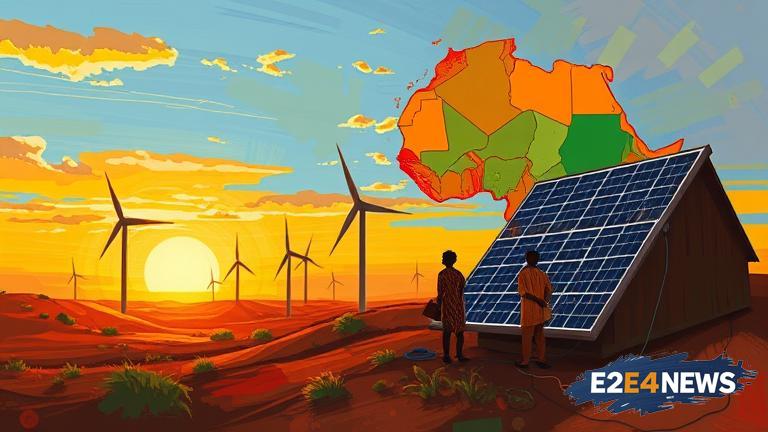The African continent is witnessing a significant shift towards renewable energy, driven by the need to address the pressing issues of energy access, energy security, and climate change. With many countries still struggling to provide electricity to their populations, renewable energy has emerged as a viable solution. Solar and wind power are becoming increasingly popular, with countries like South Africa, Egypt, and Morocco leading the way. The cost of renewable energy technologies has decreased dramatically over the years, making them more competitive with fossil fuels. This has led to a surge in investment in the sector, with many international companies and organizations committing to support Africa’s renewable energy ambitions. The African Union’s Agenda 2063 has set a target of ensuring that at least 50% of the continent’s energy mix comes from renewable sources by 2030. To achieve this goal, countries are implementing policies and regulations to support the development of renewable energy. For example, South Africa has introduced a renewable energy independent power producer procurement program, which has attracted significant investment. Egypt has also launched a number of initiatives to promote the use of renewable energy, including a feed-in tariff scheme. Morocco, on the other hand, has set a target of generating 52% of its electricity from renewable sources by 2030. The use of renewable energy is not only helping to reduce greenhouse gas emissions but also creating jobs and stimulating local economies. In fact, a report by the International Renewable Energy Agency (IRENA) estimates that the renewable energy sector could support up to 24 million jobs globally by 2030. Africa’s renewable energy revolution is also being driven by the need to address energy access. Many communities across the continent still lack access to electricity, relying on traditional biomass for cooking and lighting. Renewable energy technologies like solar home systems and mini-grids are providing a solution to this problem, enabling communities to access clean and reliable energy. Furthermore, renewable energy is helping to reduce energy poverty, which is a major obstacle to economic development. By providing access to energy, renewable energy is enabling businesses to operate, creating jobs and stimulating economic growth. The benefits of renewable energy are not limited to the environment and economy; it also has social benefits. For example, renewable energy is improving healthcare outcomes by providing energy for hospitals and healthcare facilities. It is also enhancing education outcomes by providing energy for schools and universities. In addition, renewable energy is promoting gender equality by providing women with access to energy for cooking and other domestic uses. Despite the many benefits of renewable energy, there are still challenges to be addressed. One of the major challenges is the lack of infrastructure, including transmission and distribution lines. There is also a need for more investment in the sector, particularly from the private sector. Moreover, there is a need for more research and development to improve the efficiency and affordability of renewable energy technologies. To address these challenges, governments, international organizations, and the private sector must work together to support the development of renewable energy in Africa. This includes providing financing, building infrastructure, and promoting policies and regulations that support the sector. With the right support, Africa’s renewable energy revolution can help to transform the continent, providing energy access, promoting economic development, and mitigating climate change.
